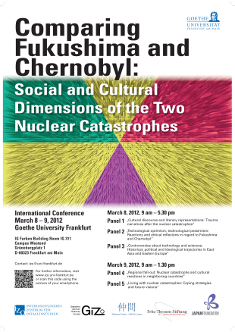Comparing Fukushima and Chernobyl: Social and Cultural Dimensions of the Two Nuclear Catastrophes
 Goethe University Frankfurt, March 8 – 9, 2012
Goethe University Frankfurt, March 8 – 9, 2012
Supported by The Japan Foundation (Tokyo), Fritz Thyssen Stiftung (Köln), Nakama-Fonds der Goethe-Universität
Download the official conference poster here.
The ongoing nuclear crisis in Fukushima will create long-term challenges for both Japan and the world. As 2011 marked the 25th anniversary of the Chernobyl nuclear disaster, policy makers and citizens in nations around the world once again balance the costs and benefits of the high-risk technology. Energy shortage is a major threat because all facets of modern societies are dependent upon energy supply and, most importantly, the nuclear disasters shattered the nuclear safety myth. The Frankfurt Interdisciplinary Centre for East Asian Studies (IZO) in co-operation with the Giessen Center for Eastern European Studies (GiZo) are bundling their research capacities to assess and evaluate the social and cultural implications of the Fukushima and Chernobyl disasters from a comparative perspective. Internationally renowned social and cultural studies experts from East Asia, Western and Eastern Europe and Northern America are invited to Goethe University. The conference consists of a two-day academic program of paper presentations and provides a forum for discussing theoretical contexts, empirical fieldwork evidence and policy backgrounds from different cultural contexts. Findings of the conference will stimulate the international debate on people’s experiences with disaster and trauma.
In particular, the project aims to shed light on the social and cultural repercussions for the nuclear disasters in Fukushima and Chernobyl. Reasoning from the prior Chernobyl experience is helpful in informing Japan’s management of the Fukushima situation and its anticipated consequences. The project stimulates multi-lateral, cross-cultural collaboration on critical issues emanating from Japan’s and the former Soviet Union’s disaster experiences and facilitates learning from different cultural contexts by raising awareness of these issues. The partners involved are planning to establish a long-term nuclear disaster related research collaboration.
Venue
Download the campus location map here.
Goethe University Frankfurt
Campus Westend, IG Farben Building Room 311
Grüneburgplatz 1, D-60323 Frankfurt am Main
Program
Download the full program here.
March 8, 2012:
10.00 - 13.00:
Panel 1 “Cultural discourse and literary representations: Trauma narratives after the nuclear catastrophes”
14.00 - 15.30:
Panel 2 “Technological optimism, technological pessimism: Reactions and ethical reflexions in regard to Fukushima and Chernobyl”
16.00 - 17.30:
Panel 3 “Controversies about technology and sciences: Historical, political and ideological trajectories in East Asia and Eastern Europe”
March 9, 2012:
09.00 - 11.00:
Panel 4 “Regional fall-out: Nuclear catastrophe and cultural reactions in neighboring countries”
11.30 - 13.00:
Panel 5 “Living with nuclear catastrophes: Coping strategies and future visions”
13.00 - 13.30:
Closing of the conference
Contact
Privatdozent Dr. Thomas Feldhoff
Coordinator, Interdisciplinary Centre for East Asian Studies
Goethe University Frankfurt am Main
Senckenberganlage 31 (Juridicum, Room 814)
D-60325 Frankfurt am Main
Tel: +49(0)69 798 23284
Fax: +49(0)69 798 23275
E-Mail: Feldhoff@em.uni-frankfurt.de
Homepage: www.izo.uni-frankfurt.de



